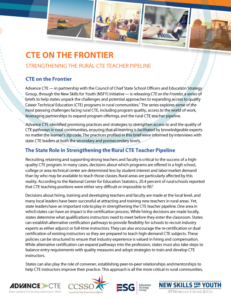This post is written by Lincoln Electric, a Diamon Level sponsor of the 2018 Advance CTE Spring Meeting.
According to the American Welding Society, 30,000 new welders must enter the workforce each year to keep up with demand and offset  retirements, and more than 10 times as many jobs will need to be filled during the next 10 years. This equates into abundant opportunities in a variety of welding disciplines for students looking to begin a career in the trades.
retirements, and more than 10 times as many jobs will need to be filled during the next 10 years. This equates into abundant opportunities in a variety of welding disciplines for students looking to begin a career in the trades.
But the welding profession is evolving, as is the definition of knowing how to weld.
To remain competitive globally, today’s manufacturers require welders with experience in more types of welds than ever before, as well as an understanding of robotic automation, advanced equipment, exotic materials, specialized code certification, welding theory and welding procedure specifications.
As the welding profession evolves, so, too, does education.

Welding booths and Statiflex weld fume extraction system at Lincoln Electric’s Welding Technology and Training Center.
In its second century of welding education, Lincoln Electric is responding to this evolution by offering U/LINC®, the industry’s most comprehensive curriculum, immersing students in the latest techniques and theories related to welding and cutting.
Our new Lincoln Electric Welding Technology and Training Center (WTTC) in Cleveland, Ohio, provides students with access to the most innovative welding solutions. In this showcase welding school environment, students learn on the latest advanced equipment, modes and processes. Advanced training is available on waveform technology, automation, production monitoring and metallurgy.
Students will leave the WTTC with both a better knowledge base about welding and about the underlying theories and rules behind specific processes. And educators, who typically come from industry with little or no background in teaching, will learn how to develop lesson plans, engage students, and adopt best practices in lab and classroom activities and take that knowledge back to their own schools. Industrial teams can tailor training around specific weld qualifications, equipment or knowledge needs. Welding, civil and manufacturing engineers seeking professional development will enhance their understanding of design with welding in mind.
Lincoln Electric is excited to play a leading role in the education and development of future generations of welders as we have for more than 100 years. We stand ready to deliver the highly skilled and knowledgeable welding leaders that industry demands.
Learn more about the complete portfolio of Lincoln Electric welding education equipment, curriculum, education discounts, educator professional development, welding simulators and more at:


 intelligently and efficiently. Students may know how to navigate Google and use a cell phone with ease, but can they format a Microsoft Excel spreadsheet? Can they use Adobe Photoshop to cut out an unintended passerby in a photo? Knowing how to use basic, ubiquitous technology tools is essential for academic and workplace success.
intelligently and efficiently. Students may know how to navigate Google and use a cell phone with ease, but can they format a Microsoft Excel spreadsheet? Can they use Adobe Photoshop to cut out an unintended passerby in a photo? Knowing how to use basic, ubiquitous technology tools is essential for academic and workplace success. In Nebraska, rural districts have been undertaking a wholesale needs assessment of local Career Technical Education (CTE) program offerings under the state’s reVISION initiative. Under reVISION, school and district leaders examine regional labor market data and hear from local employers to determine whether or not the programs available to students are those that are most in-demand.
In Nebraska, rural districts have been undertaking a wholesale needs assessment of local Career Technical Education (CTE) program offerings under the state’s reVISION initiative. Under reVISION, school and district leaders examine regional labor market data and hear from local employers to determine whether or not the programs available to students are those that are most in-demand.  (CTE) prepares learners for careers in this vital industry.
(CTE) prepares learners for careers in this vital industry.  Oregon’s Gov. Kate Brown launched the
Oregon’s Gov. Kate Brown launched the